This BAS piece by James Revill has a good summary of the issue, along with hyperlinks to many of the most recent relevant documents.
Discussion of BWC verification is a pretty big deal.

This BAS piece by James Revill has a good summary of the issue, along with hyperlinks to many of the most recent relevant documents.
Discussion of BWC verification is a pretty big deal.
More from the 1969 proceedings:
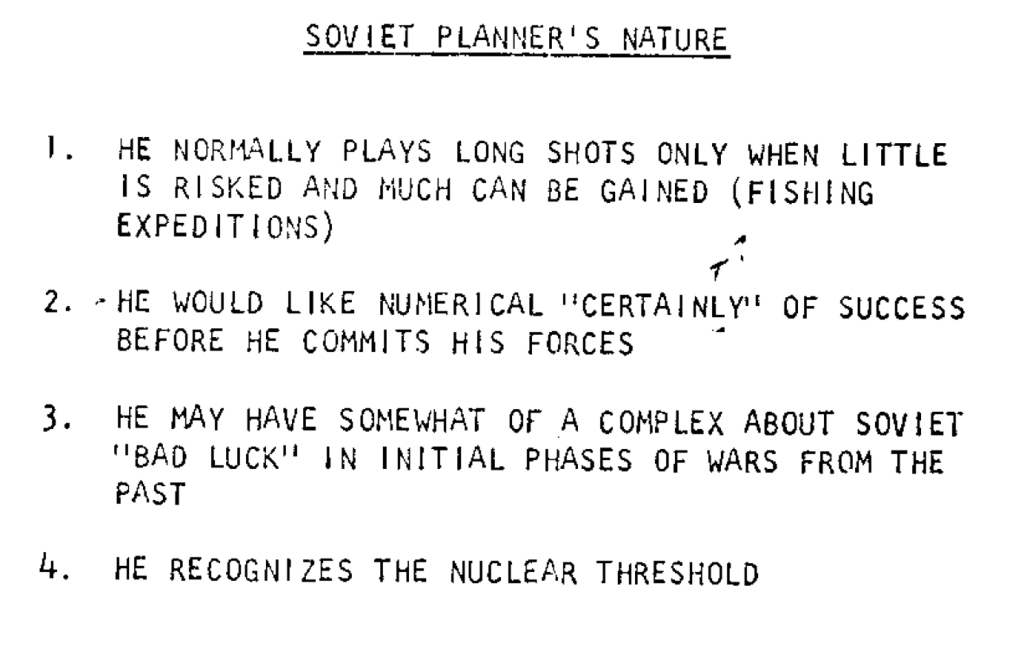
New Delhi and Islamabad are inclined to sustain the current fragile calm in their relationship following their renewal of a cease-fire along the Line of Control in early 2021. However, neither side has used this period of calm to rebuild their bilateral ties as each government has focused on more pressing domestic priorities including election perpetrations and campaigning and for Pakistan, concerns over rising militant attacks in its west. Pakistan’s long history of supporting anti-India militant groups and India’s increased willingness, under the leadership of Prime Minister Narendra Modi, to respond with military force to perceived or real Pakistani provocations raise the risk of escalation during a crisis. There remains the potential for an event to trigger a rapid escalation….heightened tension between Pakistan and India could increase the risk of nuclear escalation.
The 1969 proceedings of a DOD/AEC symposium contain this description of release procedures concerning TNW use:
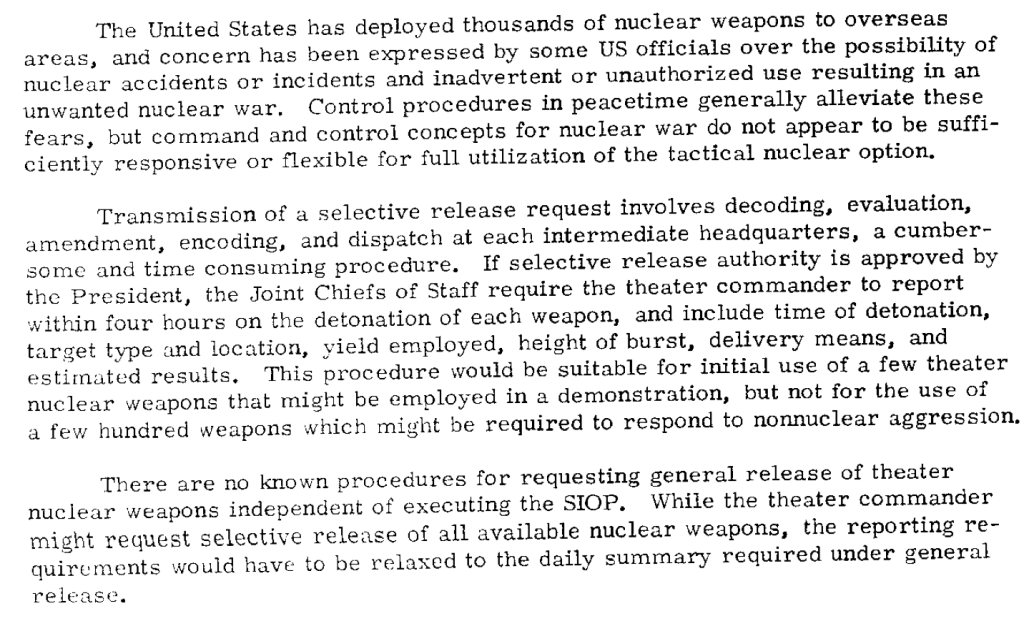
Been on a bit of a break. Following up on this post about the British nuclear deterrent, I present this exchange in Parliament between MP Neale Hanvey and Minister for Defence Procurement James Cartlidge:
Hanvey: I thank the Minister for unexpectedly allowing an intervention. He says that he is working with the US, but the reality is that the US controls the nuclear deterrent that the UK provides.
Cartlidge:
That is wholly erroneous. Yes, we have a very, very close working relationship with the United States. We recently celebrated the 60th anniversary of the Polaris agreement. With the United States we secured the freedom of Europe in the second world war, and with the United States we are continuing to secure the freedom of our United Kingdom by deterring the most significant threat that we could face.
I emphasise that while we continue to invest in our nuclear deterrent, the Government remain fully committed to the long-term goal of a world without nuclear weapons. As a country, we have a strong record on disarmament, having unilaterally reduced our nuclear forces significantly from their cold war peak. We now have the smallest nuclear warhead stockpile of the five nuclear weapons states recognised under the non-proliferation treaty, and we are the only state to have reduced its deterrent capability to a single nuclear weapons system. However, other states have not followed our example, and as we survey the dangers facing our world today, our assessment is that further unilateral disarmament would only undermine our security and that of our allies. Nevertheless, we will continue to see opportunities to advance multilateral disarmament under the framework of the non-proliferation treaty.
Our nuclear deterrent deters aggression and coercion and helps to preserve peace.
The UK government made this statement during a January debate. It’s a decent brief summary of the program:
The key point is that every day since April 1969, there has been at least one nuclear-armed Royal Navy submarine at sea, helping to keep the United Kingdom safe—the whole of the United Kingdom. In January 1980, when the House debated the successor programme to Polaris, which led to Trident—the title of this debate—the Secretary of State for Defence, Lord Pym, boiled down the Government’s position to one essential point. While acknowledging the “horrendous” nature of nuclear weapons and regretting that we could not “disinvent” them, he concluded that Britain needed to be a nuclear power because of what it would contribute to NATO’s strategy of deterrence and, through that, to our own national security.
Essentially, that has been the position of every UK Government since then. The renewal of the nuclear deterrent was approved by an overwhelming majority of 355 votes in this House in 2016, and it remains this Government’s position today. In 1980 the debate was framed by the cold war, but in 2024 the threats facing our country have multiplied and become far more complex. The number of nuclear states has grown, while Putin’s aggression and intransigence have set back the prospect of nuclear disarmament more broadly. Russia still holds around 6,000 warheads, and we face a much more assertive, nuclear-armed China. North Korea remains hellbent on honing its nuclear capabilities at the expense of the wellbeing of its own people, while Iran has repeatedly violated its international nuclear obligations and has enriched uranium far beyond what it needs for civilian purposes.
Significantly, our competitors are investing in novel nuclear technologies, including new warfighting nuclear systems, to integrate into their military strategies and doctrines. If we measure the need for an effective nuclear deterrent by the number of nuclear-armed states overtly working against the UK’s national interest, it is clear that the need to deter has never been greater. Let us not forget that a credible nuclear capability is about more than merely countering nuclear threats; it is about deterring all of the most extreme threats to our nation. That is why the Government are investing in upgrading our nuclear infrastructure to support the next generation Dreadnought-class submarines and replacement warheads. These will be some of the most advanced nuclear systems ever built, which sends a clear message to any would-be adversary.
Four Dreadnought submarines will replace the Vanguard-class submarines that have maintained our nuclear deterrent since 1992. They will give us an independent, continuous at-sea nuclear deterrent well into the second half of the century, and progress is on track to deliver the first of the Dreadnought submarines into service in the early 2030s. At £31 billion, it is correct to say that the estimated cost of the programme is significant, but we cannot develop this type of world-leading capability on the cheap, and we must also weigh that against the terrible cost of war, which is what the nuclear deterrent deters from happening
From this 2004 interview:
SG: But that is something on which in history there is still a question mark and let’s not wait for your book. Is it true that we came close to testing but we did not under American pressure?
PV: Oh, this is something which I have answered several times. This secret will perish along with me. It will never come out of my mouth. It’s for you and lots of books have been written. All off the mark. Some a little less off, some very much off.
SG: So, when will be the right time for history to know what exactly happened?
PV: No, they will never know. It’s from me and it will not come from you. You can go on approximating.
SG: But why must you not make it part of the record of history? Lots of time has gone by now.
PV: I am under an oath. An oath for me is something very sacred. It’s not like cabinet papers being circulated in advance.
The Proceedings of the 1969 Tactical Nuclear Weapons Symposium has a wealth of information. Here’s some technical data about the FROG-3:
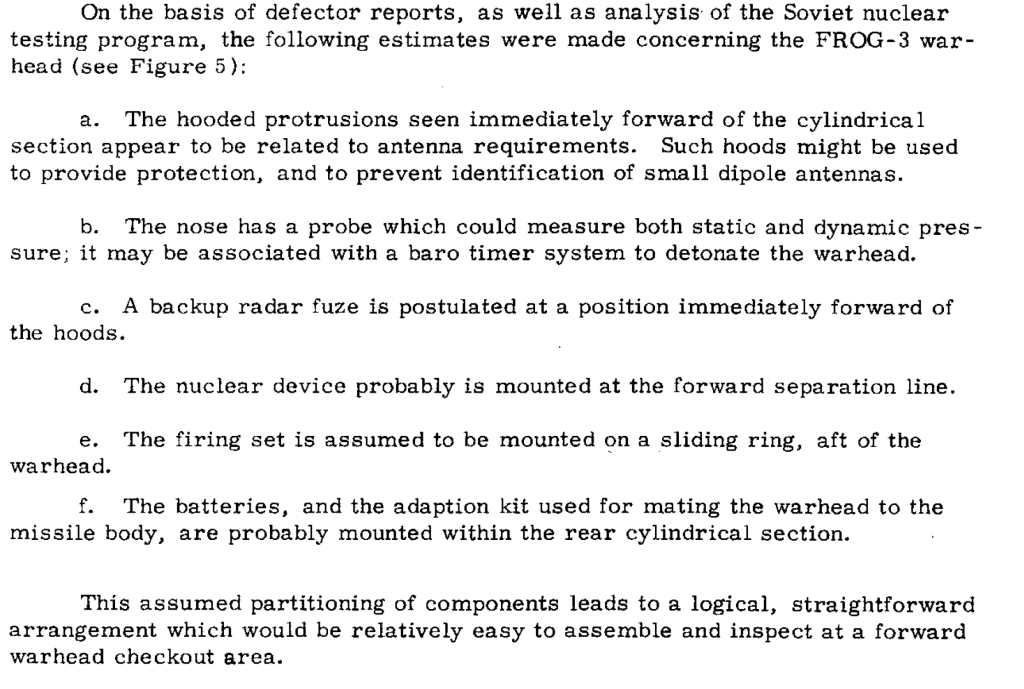
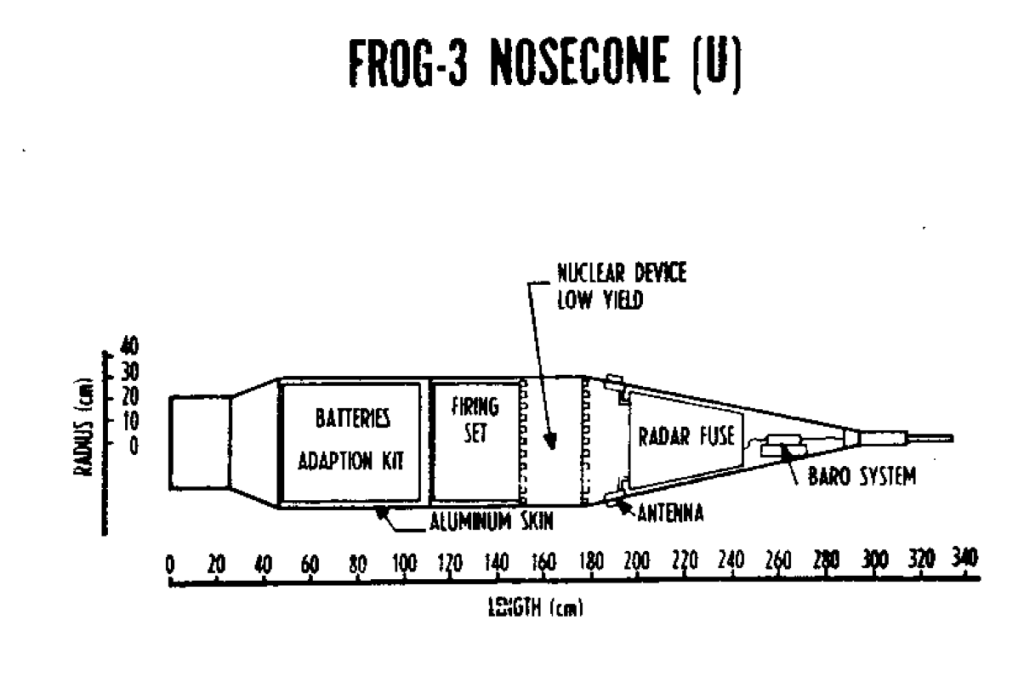
1976 ACDA memo:
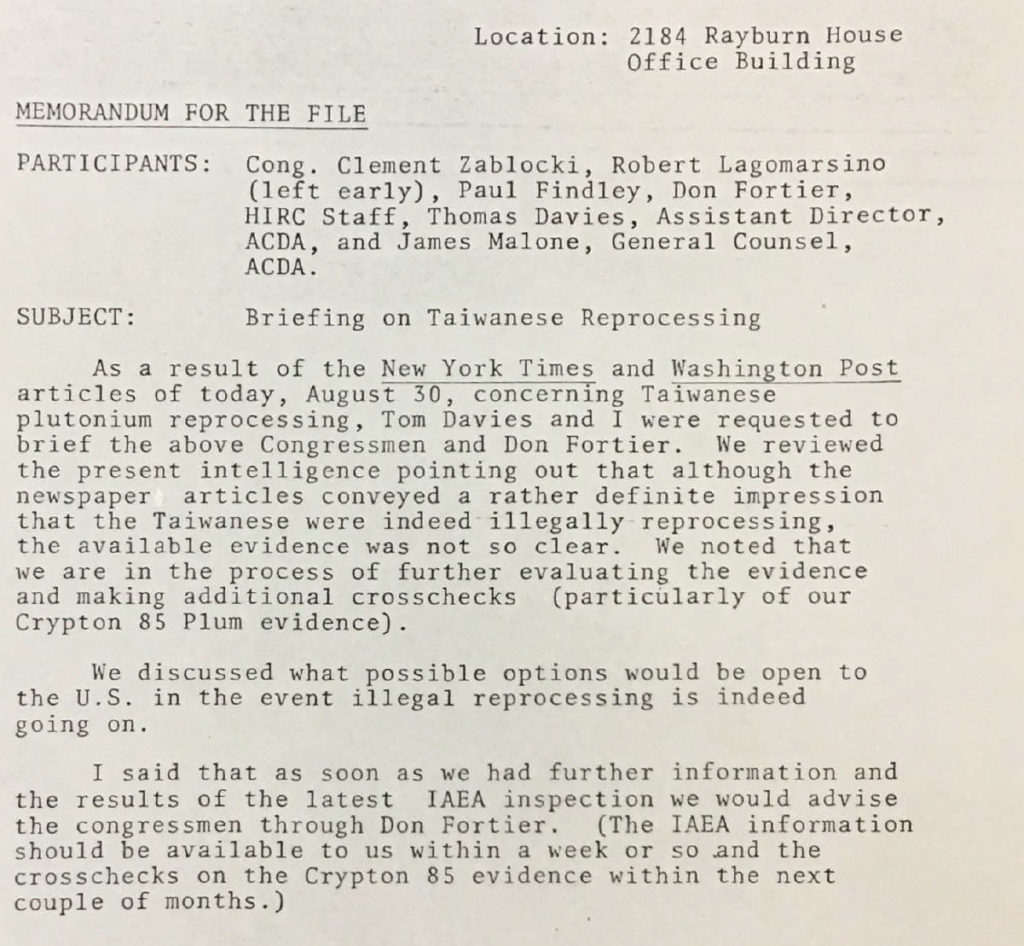
I love the headline from this piece.
Here’s the important part:
To sum it up, there is no scientific evidence to prove cow dung is an effective shielding material against atomic radiation.